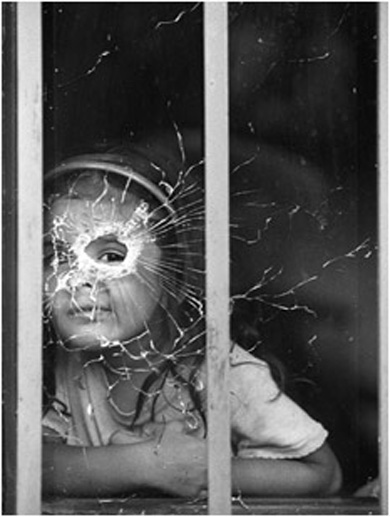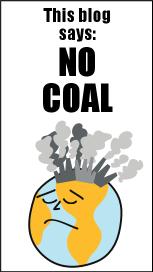 Photo courtesy of www.cdpsanjose.org
Photo courtesy of www.cdpsanjose.orgIt is the 23rd March, and in the searing heat of Colombia´s banana growing region of Uraba, a procession of 170 people descend from the mountains to the town of Apartadó. Completing the four hour walk are international solidarity activists, supporters from across Colombia and proud campesino families marking their tenth anniversary of resistance - the peace community of San Jose de Apartadó.
 On arriving in the town over a hundred cardboard coffins were placed at the gates of the cemetery and then the office of local justice in a powerful act of symbolism. Written on the coffins were the names of the assassinated. Some bore the dates of the recent massacre of September 2006. The surprise march of remembrance was a brave move by the community. Whilst police took photos from the periphery, plain clothes members of the army and likely a few civilian informants infiltrated the crowd. The message however was delivered loud and clear: we are still here, we will not forget and we want justice. Walking back from the town the procession hammered crosses on trees that marked the location of murdered compañeros.
On arriving in the town over a hundred cardboard coffins were placed at the gates of the cemetery and then the office of local justice in a powerful act of symbolism. Written on the coffins were the names of the assassinated. Some bore the dates of the recent massacre of September 2006. The surprise march of remembrance was a brave move by the community. Whilst police took photos from the periphery, plain clothes members of the army and likely a few civilian informants infiltrated the crowd. The message however was delivered loud and clear: we are still here, we will not forget and we want justice. Walking back from the town the procession hammered crosses on trees that marked the location of murdered compañeros.In February 1997, paramilitary forces entered San Jose claiming guerilla involvement. They closed down the market, ordered the community to displace and murdered four of its leaders. On March 23rd they declared themselves a peace community. In doing so they removed themselves from the clutch of armed actors that militarize and exploit their society. In ten years San Jose has suffered 35 new assassinations – 33 of these by paramilitaries and 2 by the FARC guerillas. To date the Government maintains these crimes in total impunity.
 Around one hundred visitors came to express their support and participate in the week of events, workshops and talks from community leaders and Colombian human rights NGOs. “We live in the age of the globalization of violence”, said one German delegate in a message of solidarity, “your community shines a light on the path to peace”. In equal number were members of other Colombian communities. Some belonged to the embryonic national network of 21 peace communities. One young farmer came from a community that was considering following San Jose´s example. One- by- one they stood up and told of the requisitioning of their lands, the dislocation of their way of life by war and their attempts to construct alternatives to cycle of violence that subjugates them.
Around one hundred visitors came to express their support and participate in the week of events, workshops and talks from community leaders and Colombian human rights NGOs. “We live in the age of the globalization of violence”, said one German delegate in a message of solidarity, “your community shines a light on the path to peace”. In equal number were members of other Colombian communities. Some belonged to the embryonic national network of 21 peace communities. One young farmer came from a community that was considering following San Jose´s example. One- by- one they stood up and told of the requisitioning of their lands, the dislocation of their way of life by war and their attempts to construct alternatives to cycle of violence that subjugates them. By far the largest perpetrators of these crimes are Colombia´s right wing paramilitary death squads Throughout their 15 year history they have committed around 14,000 human rights abuses including 3.300 homicides against civil society: trade unionists, indigenous groups, politicians, judges, journalists, human rights defenders, peasants and social movements According to one hidden Government report they are also responsible for at least 40% of drug trafficking in the country . The recent para-politica or ´Para-Gate´ scandal involving the Government of Alvaro Uribe (a recipient of British military aid) serves only to further expose the use of paramilitarism as an instrument of state terror.
By far the largest perpetrators of these crimes are Colombia´s right wing paramilitary death squads Throughout their 15 year history they have committed around 14,000 human rights abuses including 3.300 homicides against civil society: trade unionists, indigenous groups, politicians, judges, journalists, human rights defenders, peasants and social movements According to one hidden Government report they are also responsible for at least 40% of drug trafficking in the country . The recent para-politica or ´Para-Gate´ scandal involving the Government of Alvaro Uribe (a recipient of British military aid) serves only to further expose the use of paramilitarism as an instrument of state terror.Their economic power has grown in strength alongside their involvement with transnational mega-projects and the displacement of over 3.5 million Colombians. In March this year, Chiquita fruit brands (formerly United Fruit Company) agreed to pay a fine of $25 million to the US Department of Justice for financing the AUC paramilitary organization between 2001 and 2004. Chiquita are one of the largest trans-national corporations operating in San Jose´s Uraba region where the level of internally displaced persons is comparable to that of Rawanda. A related article in a recent edition of Semana magazine spoke of the ´banana para-republic´.
Today the tentacles of para-state violence in Uraba stretch further than ever. Community members recount tactics such as planting camouflage on the corpses of their victims and passing them off as insurgents. Another is the active encouragement of coca production amongst peasants with the end of using this as an excuse for the seizure of their land. In recent years, Government amnesties have served only to re-construct paramilitary activity. Many groups have reformed under new names such as Aguillas Negras or Black Eagles. Human rights groups worldwide also condemn the controversial Justice and Peace Law (2005) which offers death squads virtual immunity from justice. The peace community stands at the forefront of social movements actively campaign against this policy of impunity.
 Photo courtesy of www.cdpsanjose.org
Photo courtesy of www.cdpsanjose.orgThe community serves to illustrate that in Colombia, as in Chile and elsewhere, society cannot move forward silently in peace under a state that maintains an absence of truth and reconciliation. The National Movement of the Victims of State Crimes looks beyond the apparatus of state justice with bodies such as the Inter- American Court of Human Rights. It has created an Ethics Commission made up of 25 international and 5 national members. Over 10 years it will document testimonies, animate it in the public consciousness and create proposals for justice and reparation.
On a grassroots level, popular tribunals encourage political participation and clarification of the facts. It has become necessary to unite diverse sectors of social, ethnic and political groups in Colombia preserve la memoria and prevent further para-state genocide. “We are all sons and daughters of the victims” were the words of the movement leader Ivan Cepeda Vargas, who came to speak at the anniversary.
In San Jose la memoria is a living, daily reality and is central to their sense of identity and autonomy. Plans are currently underway to construct a new park of commemoration in the town. Aside from the therapeutic effect of remembrance, the act of reconstructing the past gives vitality to the present struggle for justice. In this sense la memoria and la resistancia are two sides of the same coin.
 As the community enters its second decade, it is building new bridges of solidarity and seeking new paths to justice. They continue to be vocal in linking their struggle to the fight against the impunity of state terror. Their bravery in doing so continues to inspire Uraba, Colombia and indeed the World. The challenge is nothing less than to create a peaceful reality in a country where violence and amnesia is a prevailing norm.
As the community enters its second decade, it is building new bridges of solidarity and seeking new paths to justice. They continue to be vocal in linking their struggle to the fight against the impunity of state terror. Their bravery in doing so continues to inspire Uraba, Colombia and indeed the World. The challenge is nothing less than to create a peaceful reality in a country where violence and amnesia is a prevailing norm. For more information visit, the San Jose de Apartadó website (español) or Friendship of Reconcilliation (english).

¨The Community freely:
- Participates in communal work
- Says no to injustice and impunity from the facts
- Does not participate in the war directly or indirectly or carr arms
- Does not manipulate or deliver information to any parties¨

´Travel in peace, your army is on the road. 17th Brigade´ (The 17th Brigade are one of the worse offending brigades in the Colombian Army with respect to human rights)











No hay comentarios:
Publicar un comentario